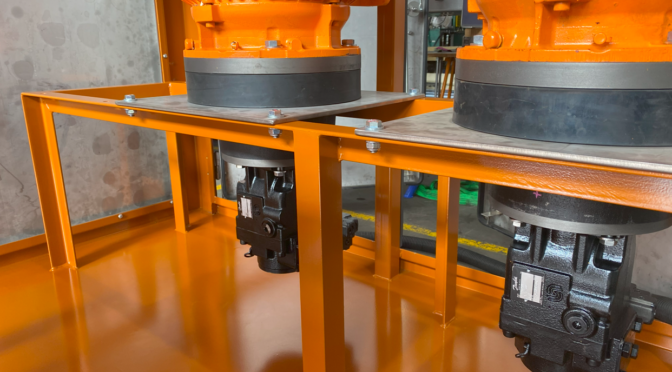News & Insights
How to Identify and Resolve Hydraulic Pump Issues in Industrial and Off-Highway Equipment

For industries across Australia – whether in mining, agriculture, defence, marine, or the renewables sector – hydraulic systems play a vital role in powering heavy machinery and equipment from mining loaders in the Pilbara to defence vehicles, agricultural harvesters, marine vessels and wind energy turbines
At the core of these systems is the hydraulic pump, a critical component responsible for maintaining pressure and flow. When it fails, everything stops.
The consequences of hydraulic pump failure can be costly: unexpected downtime, repair expenses, and loss of productivity. Identifying early warning signs and acting quickly can protect your assets and improve equipment lifespan – especially in rugged, off-highway applications where reliability is non-negotiable.
Why Hydraulic Pump Health Matters in Australia’s Harsh Conditions
In Australia, industrial and off-highway equipment must endure some of the world’s toughest working conditions – extreme heat, remote environments, and high-duty cycles. Whether you’re managing gear on a remote wind farm or running heavy-duty equipment in a quarry, operating an amphibious defence vehicle, or a harvester in regional NSW, hydraulic pump issues can bring operations to a halt.
Routine inspections and preventive maintenance are essential to ensure that your equipment stays in peak condition – especially when unexpected failures can mean expensive delays or safety risks in isolated areas.
Common Symptoms of Hydraulic Pump Failure
Being able to quickly identify signs of trouble within your hydraulic fluid pump can help prevent major issues. Here are the most common symptoms that point to a potential problem:
- Unusual noises: Whining, knocking, or screeching sounds can indicate internal wear, cavitation, or fluid aeration.
- Reduced equipment performance: If your machine is slower to respond or seems underpowered, the pump may not be delivering sufficient hydraulic pressure or flow.
- Overheating: Excess heat could point to overworked components, insufficient fluid, or restricted flow—particularly common in continuous-use applications.
- Visible Leaks: Hydraulic fluid around seals or fittings can suggest worn components or pressure imbalances and can cause hydraulic system contamination.
- Erratic Movements: Jerky or unresponsive controls may mean the pump is struggling to maintain consistent pressure or flow, potentially due to internal wear or air in the system.
Ignoring these signs can lead to total system failure—especially dangerous in mission-critical industries like defence or mining, where uptime and safety are key.
What Causes Hydraulic Pump Issues?
Understanding the root causes of hydraulic pump problems in off-highway and heavy-duty machinery helps prevent them before they start. Some of the most common culprits include:
- Contaminated Hydraulic Fluid: Dust, water, and other particles – especially common in dusty, remote environments – can degrade performance and cause long-term damage.
- Air in the System (Cavitation): This leads to loss of pressure, noise, and component erosion, increasing the risk of internal damage.
- Wear and Tear: Components like seals, pistons, and bearings naturally wear down over time – especially in high-pressure, heavy-duty applications.
- Inadequate Maintenance: Missed servicing schedules or incorrect fluid handling often contribute to early failure.
How to Troubleshoot Hydraulic Pump Problems
Proactive troubleshooting is the key to avoiding breakdowns. Not sure where to start? Here’s how to systematically check your system:
- Inspect for Visual Clues: Look for leaks, damaged hoses, and loose fittings.
- Listen for Changes: Pay attention to sounds during operation – any whines, knocks, or rattles can indicate internal issues.
- Check Fluid Quality and Levels: Dirty or low fluid can compromise pump efficiency. Make sure the fluid matches OEM specifications and is kept at the recommended levels.
- Monitor Machine Behaviour: If performance drops or operations slow, test pump output pressure and flow.
- Engage Experts for Diagnostics: When in doubt, consult with professionals who can conduct pressure testing, fluid analysis, and detailed system inspections.
Preventive Maintenance Tips for Australian Conditions
Preventive measures help extend the lifespan of your hydraulic system – this is especially important when hydraulic equipment is running in the hot, dusty, or remote environments that are common in Australia.
- Follow OEM Maintenance Schedules: Stay ahead of wear by scheduling regular service intervals.
- Use Quality Hydraulic Fluids: Always use manufacturer-recommended fluid for your specific equipment and application.
- Keep It Clean: Prevent contamination by storing fluids properly and cleaning fittings before maintenance – minimising dust and dirt in and around hydraulic systems is especially important in agricultural and mining environments.
- Train Operators and Technicians: Ensure your team knows how to spot and report symptoms early.
Support When You Need It Most
Whether you’re running a solar farm in South Australia, operating cranes in the marine sector, or managing fleets in the defence industry – reliable hydraulic systems are non-negotiable.
Hydraulic pump failures don’t wait for a convenient time – and they certainly don’t consider your project deadlines! That’s why it’s vital to partner with experts who understand industrial and off-highway equipment across all Australian sectors.
At Custom Fluidpower, we specialise in diagnostics, servicing, and supplying hydraulic pumps and system components for Australia’s most demanding applications. Whether you’re operating in transport, materials handling, mining, or renewables, our team is ready to help keep your equipment running smoothly and safely.
Don’t Let a Small Issue Become a Big Problem
Being proactive about your hydraulic system health means fewer breakdowns, more uptime, and better return on investment. Don’t wait for a minor issue to become a major repair. Act early, maintain regularly, and work with experts who know the unique challenges of Australian industries.
Explore Custom Fluidpower’s range of hydraulic pump solutions and support services or contact our team for expert help that is tailored to meet the needs of Australia’s toughest industries.
